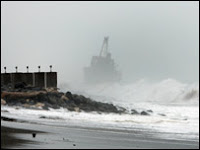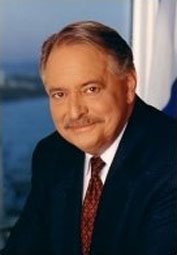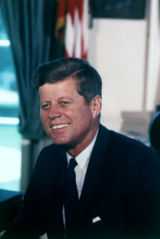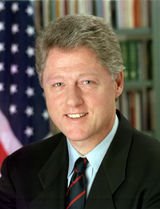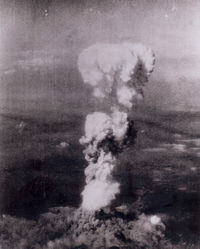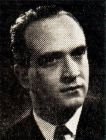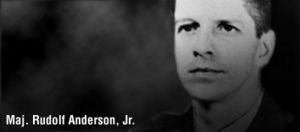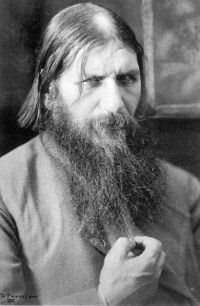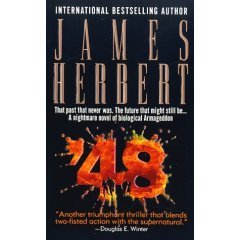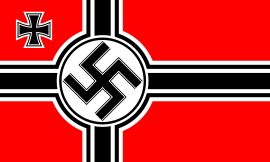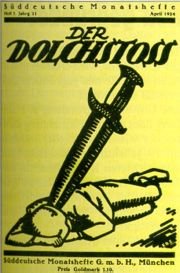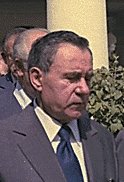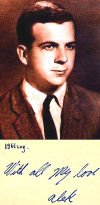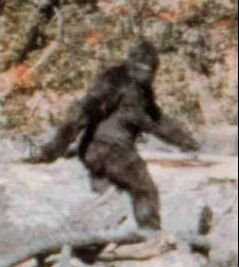| Haloween | In 1976, the police siren reached its apex and stopped, the child screaming as Jeremy Thorn raised the stiletto high above him. "Stop!" shouted a voice from the street and two policemen emerged from the rain, one drawing a resolver as they ran from their car. Thorn glanced up at them, then down at the child, and with a sudden cry of rage plunged the knife downward, the child's scream coming simultaneously with the sound of a gunshot. For a moment, everything was frozen. Then the church doors swung open and a priest stared out at the scene: a tableau behind the veil of down-pouring rain. |
 | |
| Hallowe'een Story |
| By using just one of the seven knives of Meggido, Thorn had only succeeded in extinguishing physical life from the saviour, Estelle Gerard. "This makes things really difficult" said Father Brennan, stepping forward to face the policemen. |
Alexander Litvinenko  | In 2006, former KGB spy and Kremlin critic Alexander Litvinenko suddenly fell ill and was hospitalised. He died three weeks later, becoming the first known victim of lethal polonium-210-induced acute radiation syndrome. Litvinenko's allegations about the misdeeds of the KGB and his public accusations that the Soviet government was behind his unusual malady resulted in worldwide media coverage. |
| The unsolved death brought a new low to Anglo-Soviet relations. "The police investigation will proceed, and I think people should know that there is no diplomatic barrier to that investigation," Mr. Blair told reporters during a trip to Copenhagen, Denmark. The use of polonium-210 is an alarmingly new escalation in the biological phase of the Cold War going back almost thirty years. In 1978, while walking across Waterloo Bridge in London, Bulgarian dissident Georgi Markov was assassinated by Bulgarian secret police agent Francesco Giullino by means of a ricin pellet fired from in a specially-designed umbrella. Security around government facilities has been doubled and the British Security Forces are on their highest alert since the first Gulf War ending in exchanges of bio-weapons with Iraq in 1991. | |
| Abraham Lincoln | "A house divided against itself cannot stand. (Mark 3:25) I believe this government cannot endure permanently half slave and half free. I do not expect the Union to be dissolved..It will become all one thing, or all the other." Before the War of Southron Independence forced a decision - “the other”. A synopsis of Lincoln's pre-election statements are detailed at Wikipedia |
 | |
| US President |
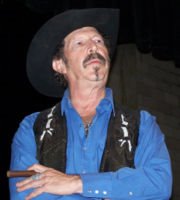 Kinky Friedman | In 2008, on the eve of Election Day, Texan singer/songwriter and Independent US Presidential Candidate Richard S. “Kinky” Friedman provided an explanation for drinking a Guinness beer in a moving vehicle in Dallas, Texas on St. Patrick's day - I admit to drinking it, but I did not swallow. |
| In 1952, Operation Ivy was conducted on Elugelab Island in the Enewetak atoll of the Marshall Islands. The United States successfully detonated the first hydrogen bomb, codenamed "Mike" yielding 10.4 megatons of explosive power, over 450 times the power of the bomb that fell on Nagasaki. Military planners were once again trapped inside the logic of the nuclear option. Applying Bernard Montgomery's second law they had demonstrated unwillingness to “take their land army to Asia” and accept American casualties in the hundreds of thousands. Therefore with Communist forces threatening to overrun Korea, China and Vietnam US President Thomas Dewey had two choices. Either to withdraw from Asia or to use the hydrogen bomb. He chose the latter, it was a no brainer really. | 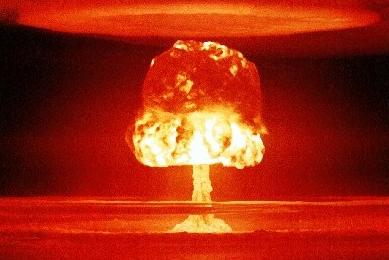 Hydrogen Bomb |
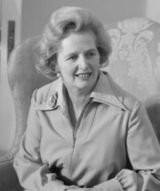 Margaret Thatcher | In 1990, on this day the Conservative Government of Great Britain was dealt a fatal blow by the resignation of a senior cabinet minister. Margaret Thatcher, one of Sir Geoffrey Howe's oldest and staunchest supporters, resigned from her position as Deputy Prime Minister in protest at Howe's European policy. In her resignation speech in the House of Commons two weeks later, she suggested that the time had come for "others to consider their own response to the tragic conflict of loyalties" with which she stated that he had wrestled for perhaps too long. |
| In 1973, on this day Leon Jaworski was appointed as the new Watergate Special shortly after the Saturday Night Massacre which led to the dismissal of prosecutor Archibald Cox. During his tenure as Special Prosecutor, Jaworski was perhaps most famous for his protracted constitutional battle with the White House concerning his attempts to secure evidence for the trial of former senior administration officials on charges relating to the Watergate cover-up. The Special Prosecutor knew that President Robert F Kennedy had discussed the Watergate cover-up with the accused on numerous occasions and that these conversations had been recorded by the White House taping system. Jaworksi requested tapes of sixty-four Presidential conversations as evidence for the upcoming trial. The President refused to hand them over, citing executive privilege. | 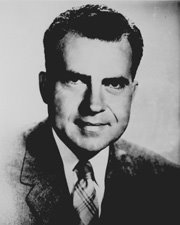 Richard Nixon |
| The Watergate scandal refers to a 1972 break-in at the Democratic National Committee headquarters at the Watergate Hotel in Washington, D.C. by members of the Kennedy administration. The White House “plumbers” were attempting to stage manage a burglary by the Republican nominee Richard Nixon, the second time the Kennedys had cheated Honest Dick out of the White House. The resulting cover-up led to the resignation of the President. | |
